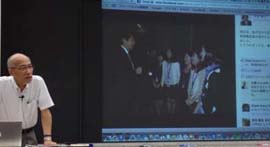 早稲田大学 ジャーナリズム研究所 J-Freedom |
Depot in English
HOME
 A Real Crisis, a Real Hope
A Real Crisis, a Real HopeOn July 1st I presented a short speech at the conference of Japan Focus: The Asia-Pacific Journal on Contemporary Crises in the Asia-Pacific, invited by David McNeil who organized and moderated the session on the Attack on Critical Journalism and the False News Debatte: Japan, the US and the Asia-Pacific. I carry here the full text of my presentation.
………………………………………………………………
A real crisis, a real hope
Tatsuro Hanada
The black ships (“Kurofune”) of Commodore Matthew Calbraith Perry famously forced Japan to open up to trade with the rest of the world in the mid-19th century. Recently another symbolic black ship visited Japan to tell the government and people about international legal standards of freedom of opinion and expression based on Article 19 of the International Covenant on Civil and Political Rights (“ICCPR”), and to open the Galapagos-like conditions of media and journalism in this country.
When I read the report by David Kaye, the UN’s special rapporteur for freedom of expression, however, I found that his aim is neither to criticize the Japanese government and media institutions nor to put pressure on them. David Kaye’s academic title is clinical professor of law, director of international justice clinic at University of California, Irvine. That should provide a clue to his mission.
He visited Japan last year to examine freedom of opinion and expression as if he were a clinical doctor examining a patient. At the end of May this year, he sent his report - in effect a medical certificate of health - to the UN Human Rights Council. He diagnosed the Japanese media as suffering from an acute lack of independence. The core conclusions and recommendations in his report refer to this lack of independence, aimed at three parties: the Government, media groups and journalists. Specifically:
* The Government should develop a framework for an independent regulator of broadcasting media.
* Media groups should publicly reject any form of threat and intimidation of journalists or other professions carrying out investigative reporting work.
* Journalists should assess how the promotion of independent reporting could be furthered by the promotion of associations among media professionals. For that purpose journalists should have greater collective solidarity.
I would say in short that what Mr. Kaye said to journalists in Japan simply was, in the words of reggae star Bob Marley: “get up, stand up for your rights!”
Among the three addressees of these recommendations, only the government responded - defensively - presumably because it feels under attack by this new black ship. Government officials cannot understand that the UN Special Rapporteur’s report is a medical certificate. Media organizations and journalists, on the other hand, have stayed silent.
In my view, Japan’s media organizations are not interested in investigative reporting, having given up their roll as public watchdog. Journalists are silent because there is no professional association of journalists in Japan. Indeed, reporters employed in Japanese mass media companies probably do not recognize themselves as journalists, as it is commonly understood as profession. Therefore they can hardly feel that Kaye’s recommendations apply to them.
This is a real crisis of journalism in Japan: In mainstream media there is a dearth of watchdog journalists committed to investigative journalism.
By the way, I am neither a journalist nor a clinical professor of law. I would say that I am an experimental professor of sociology. As director of the Institute for Journalism at Waseda University I coordinate the Waseda Investigative Journalism Project, which created the investigative news site, Waseda Chronicle in February this year. The Chronicle is a university-based, nonprofit and investigative newsroom, which will join the global movement of investigative journalism. In June this year, the board of the Global Investigative Journalism Network approved Waseda Chronicle for membership. This project is an experiment to develop a new sustainable model of investigative journalism, including content, production and financing.
If watchdog journalism cannot find its proper place in the mainstream media in Japan, the function and the sprit of journalism will leave and look for a new home, perhaps online or in a civil society stakeholder such as an NGO. The mainstream media does not have exclusive rights over watchdog journalism. New carriers are emerging in the form of associations. This is a real hope for journalism in Japan. For this hope we need support from global civil society and collaboration with other actors and players in the movement, especially around Asia.
(チラシを拡大して見る )
本研究所招聘研究員のマーティン・ファクラーさんの論文が『コロンビア・ジャーナリズム・レビュー』に10月25日に掲載されました。同誌は、米国コロンビア大学ジャーナリズム大学院が出しているジャーナルで、ジャーナリズム分野では世界で最も影響力の強い雑誌と見なされています。論文タイトルは“Sinking a bold foray into watchdog journalism in Japan”。「日本で果敢に開始されたウォッチドッグ・ジャーナリズムの敗北」。多くの賞を獲得した「プロメテウスの罠」を生み出した朝日新聞特別報道部の、いわば「栄光と悲惨」がよく描かれています。・・・・(続きを読む)

(英文記事・全文を見る)
 ■2016年4月7日
■2016年4月7日“Power and journalism in “Jipang”: From Galapagos to Rhodes”, a keynote address by Tatsuro Hanada at the symposium to celebrate the founding of the WASEDA University Institute for Journalism on July 4, 2015
Announcement of FCCJ
Press Conference: "Crisis of Asahi and Japanese Journalism" by Kaido, Kamata & Hanada at FCCJ,December 16, 2014
Video on the Press Conference
Press Conference: "Crisis of Asahi and Japanese Journalism" by Kaido, Kamata & Hanada at FCCJ,December 16, 2014
Video on the Press Conference